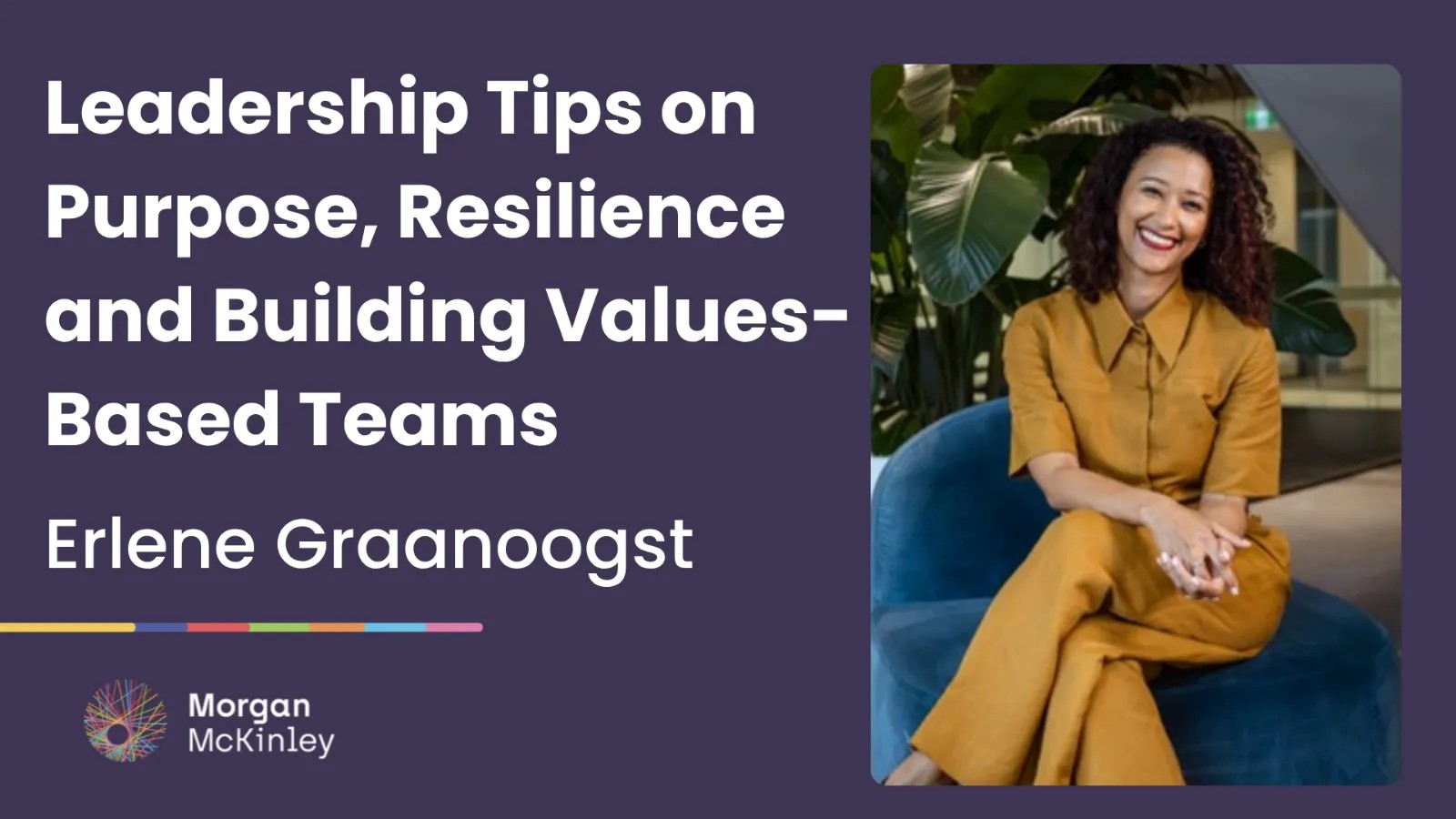Erlene Graanoogst: Leadership Tips on Purpose, Resilience and Building Values-Based Teams

Erlene, Executive General Manager of Operation Excellence at the Australian Financial Complaints Authority, has built a career defined by purpose-driven leadership, resilience, and the ability to cultivate diverse, high-performing teams. She leads with openness, encouragement and passion. Through her career as COO/Head of Operations, she has led Change, Transformation, and Business Management across global financial hubs, including Amsterdam, New York, and Sydney.
In this Women in Leadership feature, she reflects on the key drivers of her success, her commitment to inclusion and operational excellence, and the lessons she has learnt from fostering authentic and values-based relationships in the workplace.
Keys to Career Success: Purpose, Resilience and Relationships
What factors do you think have been critical to the success that you've achieved in your career so far?
Multiple things pop up in my head, but if I were to summarise, I’d say three main factors.
Firstly, staying anchored to a purpose. So for everything I do and decide to spend my time on, I make sure the ‘why’ is clear. That makes it easier to say no to certain things and to be more focused because whatever I do, work-related or personal, it's all about creating a meaningful impact. If I were to reflect on myself being fresh out of university, my main focus was delivering results and outcomes. That has now changed into how much impact I’m having, which I find more important. I would prefer to do less and have a greater impact.
Secondly, I would say being resilient. In today’s fast and ever-changing world, this means to me being agile, being able to adjust and adapt quickly. Importantly, this involves being kind to yourself, and what I mean by that is a decision made today might not be relevant tomorrow, and you’ll have to be able to let it go without being hard on yourself.
My third and final driver of success has been around building values-based relationships. What I mean by this is maybe a colleague and I share the same ethics, which gives us common ground, or maybe another colleague with a different perspective challenges the way I think in a constructive sense. Embracing these strong relationships results in having healthy debates, which stimulate fresh ideas and align perspectives. My success so far couldn’t have been possible without the collaboration and development from others.
This approach to relationships is fundamental to me, but it’s also important to empower others because you can't be across everything. Especially when you think about building a team, you bring together all these capabilities, and it's so easy to hire someone that reflects you, but it's so much better for the team to have someone who complements the team dynamics instead of mirroring it. Each person brings their own superpowers.
So, going back to your question, its purpose, resilience, and building values-based relationships have been critical to success in my career.
Women’s Perspective and Leadership Impact
Reflecting on your leadership journey, can you share key moments where your perspective as a woman significantly impacted the outcome? What did you learn in that situation?
As a woman, I find it hard to say, because I just think as a human being. Maybe as women, we do have some superpowers. These are the traits that I believe are important, independent of whether you’re a woman or a man.
When you think about operational excellence, it's about bringing systems thinking, but then with a people-focused lens on that. You are able to have empathy and operational rigour that can coincide. It's not one or the other because if you think about operational excellence or the type of work that I've done in the past, it can be really numbers-driven and efficiency-focused, and it's really the people lens and the human focus that brings your work to the next level.
One thing I can say about myself is that I have an elephant's memory. I might forget someone's name, but I remember their face. I remember a story that they’ve told me. For example, I would remember someone's dog's name or that something happened in someone's family or this crazy holiday that they had. It really goes back to individualisation. Even though I work in teams and have multiple stakeholders, I approach each person in a different way based on how I know them. You know, sometimes people would be happy for you to share something and for them to respond immediately, whereas others will need some time to think about it, and others again would like you to have that conversation before the meeting instead of just going directly into it. So, it's all personal preference, and by acknowledging and respecting that, you build deeper connections which contribute to what I call magic. You build trust, which is the foundation for having high-performing teams.
Commitment to Diversity and Inclusion
How has your commitment to diversity and inclusion shaped your team building and leadership in your operational excellence roles or any of your roles in the past? Have you seen any tangible impacts?
I intentionally build diverse teams. It's not something that just happens. I look for diverse backgrounds, different thinking styles and life experiences. From a starting point, you usually focus on process, metrics, efficiencies and data, and it’s really easy to get caught up in this. But then, if you bring those diverse backgrounds and business fundamentals together, what I've seen is that it really sharpens decision-making. On top of that, it also deepens engagement. The more you connect, the better the results and outcomes.
We’re all aware that research and studies show that by increasing diversity in teams, you increase the team’s capability for innovation and outcomes. That’s when you design work that's fit for purpose and future-proof. When you ask about tangible impact, I think about solving the problems of today while planning and anticipating for the problems of tomorrow.
I believe inclusion is a core enabler for excellence. It's a must – it's a missed opportunity if you don't consider doing that.
Fostering Trust and Psychological Safety
When you have such a diverse team, you obviously have fostered very trusting relationships within that team so that people feel like they can speak up. Is there anything specific that you do to foster those relationships or bring those teams together so that they have the confidence to question things or push back or change the status quo?
Creating that space for teams starts with leading authentically. The environment needs to be one where people can interact authentically with respect. Authenticity doesn’t mean saying everything on your mind. It means aligning what you say and do with your values while understanding the context and impact. I always advise others to be true to themselves, but also to be thoughtful about how, when and why they speak up in certain ways.
I encourage a culture where it’s exciting to have another perspective shine on your idea, a detail that everyone else has overlooked. This leads to greater collaboration and strengthens psychological safety.














